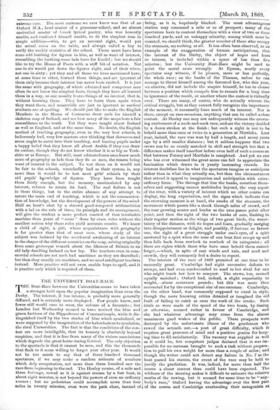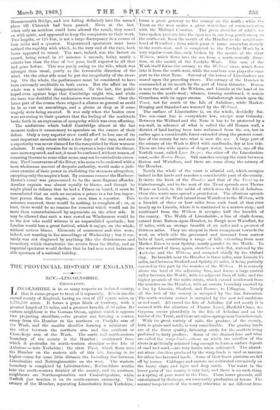THE UNIVERSITY BOAT-RACE.
THE Boat-Race between the Universities seems to have taken a stronger hold upon the popular imagination than even the Derby. The interest, if less intense, is probably more generally diffused, and is certainly more displayed. Few people know, and fewer still would care to wear, the colours of a favourite ; but London last Wednesday seemed to have revived the blue and green factious of the Hippodrome of Constantinople, while it distinguished itself by the two shades of blue which symbolized, or were supposed by the imagination of the haberdashers to symbolize, the rival Universities. The fact is that the conditions of the contest are more intelligible, that its honesty is absolutely beyond suspicion, and that it is free from many of the vicious associations which degrade the great horse-racing festival. The only objection to the spectacle is that it cannot be seen, and this the thousands that flock to it seem willing to forget year after year. It would not be too much to say that of three hundred thousand spectators, if we may make a random estimate of numbers which defy computation, not more than three hundred saw the race from beginning to the end. The Henley course, of a mile and three furlongs, rowed as it is against stream by a fast boat, in about eight minutes, is not beyond the powers of even an ordinary runner ; but no pedestrian could accomplish more than four miles in twenty minutes, even were the path clear, instead of being, as it is, hopelessly blocked. The most advantageous station may command a mile or so of prospect; many of the spectators have to content themselves with a view of two or three hundred yards, and an unhappy minority, among which must be counted, we should think, the greater number of those who occupy the steamers, see nothing at all. It has often been observed, as an example of the exaggeration of human anticipations, that the interest of the Derby, the object of hopes and fears so intense, is included within a space of less than five minutes ; but the University Boat-Race might be used to point the moral more strongly. At Epsom, nearly every spectator may witness, if he pleases, more or less perfectly, the whole race ; on the banks of the Thames, unless he caa manage to thrust himself among the favoured few, who this year, we observe, did not include the umpire himself, he has to choose between a position which compels him to remain for a long time in ignorance of the result, or another where the contest is virtually over. There are many, of course, who do actually witness the critical struggle, but as they cannot fully recognize the importance of the moment, it necessarily loses much of its interest. Nor is there, except on rare occasions, anything that can be called a close contest. At Henley one may not unfrequently witness the crowning excitement of a neck-and-neck race, and see the victory decided by a dozen strokes at the finish ; but such a sight is not to be beheld more than once or twice in a generation at Mortlake. Last year, indeed, the race was won by half a length, and many years ago by a still smaller distance ; but it seldom happens that two crews can be so evenly matched in skill and strength but that a difference makes itself manifest before even half of such a course as that between Putney and Mortlake is completed. And yet no one who has ever witnessed the great scene can fail to appreciate the fascination which draws to it yearly increasing crowds. Its interest doubtless lies in what the spectators imagine or anticipate rather than in what they actually see, but then the circumstances that attend it appeal to imagination and anticipation with extraordinary force. The throngs that line the banks, countless themselves and suggesting unseen multitudes beyond, the very aspect of the river, with a variety of interest which no other course can display, the long expectation, and the signs which indicate that the crowning moment is at hand, the smoke of the steamers, the movement which passes like a shock through miles of crowd, and the roar growing nearer and louder as the race passes point after point, and then the sight of the two banks of oars, flashing in their regular motion as the wings of two great birds, the uncertainty of the distance, with its hopes and fears, gradually merging into disappointment or delight, and possibly, if fortune so favour oue, the sight of a great struggle under one's eyes, of a spirt answered by a spirt when the nose of one boat first creeps up and then falls back from rowlock to rowlock of its antagonist; all these ure sights which those who have once beheld them cannot forget,—which, in spite of east winds and rain, and mud and crowds, they will commonly feel a desire to repeat.
The interest of the race of 1869 promised at one time to be unusually great. Cambridge had eight successive defeats to avenge, and had even condescended to send to her rival for one who might teach her how to conquer. The crews, too, seemed equally matched ; Oxford had, indeed, a slight superiority in weight,—about seventeen pounds ; but this was more than accounted for by the exceptional size of one oarsman. Cambridge, on the other hand, was commonly supposed to excel in style, though the more knowing critics detected or imagined the old fault of failing to catch at once the work of the stroke. Such trials as were made of the speed of the two boats, by timing or otherwise, seemed rather in favour of Cambridge, and she had whatever advantage may come from the almost unanimous good wishes of the public. These prospects were destroyed by the unfortunate illness of the gentleman who rowed the seventh oar,—a post of great difficulty, which it requires great presence of mind and a positive genius for keeping time to fill satisfactorily. The vacancy was supplied as well as it could be, but competent judges declared that it was impossible for an oarsman brought to such a task without preparation to pull his own weight for more than a couple of miles; and though the writer could not detect any failure in No. 7 as the boat passed his station, the event of the race may be held to justify the prediction. It was, indeed, for more than half the course a closer contest than could have been expected. The wildness of the steering makes it difficult to estimate the relative merits of the rowing, but it seemed for some time to be "anybody's race," Oxford having the advantage over the first part I of the course and Cambridge overhauling their antagonists at
Hammersmith Bridge, and not falling definitely into the second place till Chiswick had been passed. Even at the last, when only an accident could have altered the result, they rowed on with spirit, and appeared to keep the conquerors to their work. Two lengths, or 125 feet, is not a large discrepancy in a course of four miles and a quarter. Experienced spectators must have noticed the rapidity with which, to the very end of the race, both boats appeared to travel. The race, indeed, was the fastest on record, being rowed in 20 minutes 5 seconds, being nearly a minute less than the time of last year, itself superior to all that had gone before. This was partly owing to the tide, which was stronger than usual, partly to the favourable direction of the wind. On the other side must be put the irregularity of the steering. On the whole, the performance must be considered to have been extremely creditable to both crews. But the affair on the whole was a terrible disappointment. To the last, the public hoped even against hope that Cambridge might win, and while the issue was doubtful the enthusiasm was tremendous. Over the latter part of the course there reigned a silence as general as could be in so vast an assemblage, and a gloom as deep as if some tragedy were being enacted. It was only when the beaten crew were returning to their quarters that the feeling of the multitude broke forth in an expression of sympathy which was even affecting.
The misfortune which befell Cambridge almost at the last moment makes it unnecessary to speculate on the causes of their defeat. Only a very superior crew could afford to lose one of its most important members within a few days of the race, and such a superiority was never claimed for the vanquished by their warmest admirers. It only remains for us to express a hope that the threat, once more repeated, and not, it must be confessed, without reason, of removing the race to some other scene, may not be carried into execution. The Conservators of the River, who seem to be endowed with a most wholesome amount of despotic authority, would make a judicious exercise of their power in abolishing the steamers altogether, excepting only the umpire's boat. By common consent the HarbourMaster's vessel was pronounced to be the most flagrant offender. Another captain was almost equally to blame, and though he might plead in defence that he had a Prince on board, it must be remembered that on such an occasion a prince is a far less important person than the umpire, or even than a reporter. This nuisance removed, there would be nothing to complain of ; or, at least, there would be no reasons for removal which would not be more than counterbalanced by arguments on the other side. It may be allowed that such a race rowed on Windermere would be to the few who could witness it an unparalleled spectacle ; but London would lose a great festival, which it enjoys, on the whole, without serious blame. Elements of coarseness and vice were, indeed, not wanting in the assemblage of Wednesday ; but it certainly was not disgraced by anything like the drunkenness and immodesty which characterize the return from the Derby, and an impartial spectator would declare that he had seen a not unfavourable specimen of a national holiday.



































 Previous page
Previous page